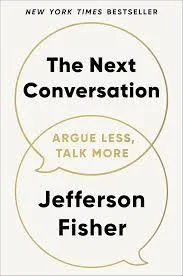
The Next Conversation, Bonus Chapter
Talking to Narcissists Without Losing Yourself
Insights from Jefferson Fisher’s The Next Conversation.
We’ve covered the four core rules of The Next Conversation: staying calm, speaking confidently, getting curious, and focusing on your goal. But sometimes, life throws us a curveball: dealing with a narcissist.
Narcissists, with their need for control, lack of empathy, and constant craving for validation, can make even the simplest conversation feel like a battlefield.
So, how do you bring The Next Conversation tools into these tricky interactions? Here’s what Jefferson teaches, and how you can protect your peace while staying true to yourself.
Set Clear Boundaries And Stick to Them
Jefferson’s Advice: With narcissists, boundaries aren’t just helpful—they’re essential.
They might try to manipulate, gaslight, or twist your words. That’s why you need to decide in advance what you will and won’t accept. And be ready to calmly enforce those limits.
Instead of letting them control you, try this:
“I’m happy to talk when we can be respectful.”
“I’m not going to engage if the conversation gets personal.”
“Let’s pause and revisit this later if things get heated.”
Your boundaries are your shield. Use them to protect your emotional energy.
Control Your Own Calm—No Matter What
Jefferson’s Advice: You can’t control their reaction, but you can control yours.
Narcissists often try to provoke strong emotional responses. Jefferson reminds us that the best defense is a composed offense.
Instead of losing it, try this:
Use your “conversational breath” before responding.
Keep your voice steady and your body relaxed.
Avoid taking bait or escalating.
Your calm is a power move. Don’t hand over your emotional thermostat to them.
Don’t Expect Empathy And Focus on Your Goal
Jefferson’s Advice: Trying to get empathy from a narcissist is usually a dead-end.
Instead, shift your focus to what you want to accomplish. Is it setting a boundary? Getting clarity? Protecting yourself? Set your goal and commit to that direction.
Instead of letting them derail, try this:
“My goal is to keep this conversation civil.”
“I’m here to share my perspective, not to change yours.”
“Let’s agree to disagree and move forward.”
Keep your expectations realistic to avoid frustration and disappointment.
Use Curiosity Strategically
Jefferson’s Advice: Curiosity can be a useful tool— even with narcissists —but it looks different.
Instead of asking “Why did you do that?” (which may invite manipulation), ask clarifying questions that help you gather information without getting pulled in emotionally.
Instead of “Why” questions, try this:
“Can you help me understand what you mean by that?”
“What’s most important to you about this?”
“How do you see this situation?”
This kind of curiosity keeps you in the driver’s seat, not the passenger.
Know When to Walk Away
Jefferson’s Advice: Sometimes the healthiest choice is to step back.
Not every conversation will be productive, and that’s okay. Jefferson encourages recognizing when to protect your peace by ending the interaction.
Instead of falling into the spiral, try this:
“I’m not going to continue this conversation right now.”
“Let’s take a break and revisit this later.”
“I need some space to think.”
You don’t owe anyone your emotional energy, especially when it’s being drained or weaponized.
Takeaway
Conversations with narcissists are some of the toughest out there. But when you’re armed with The Next Conversation tools, you can stay grounded, keep your voice, and protect your well-being.
Remember:
Set firm boundaries.
Stay calm.
Focus on your goal.
Use curiosity as a tool, not a trap.
And know when it’s time to step away.
You don’t have to play their game to win your peace.